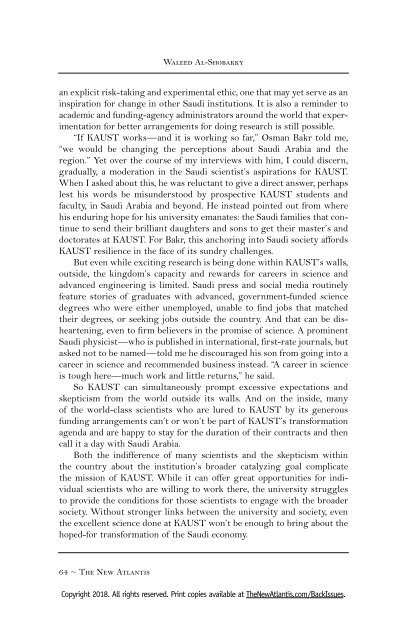The New Atlantis - Winter 2018 (Issue 54) uncompressed with cover
Create successful ePaper yourself
Turn your PDF publications into a flip-book with our unique Google optimized e-Paper software.
Waleed Al-Shobakky<br />
an explicit risk-taking and experimental ethic, one that may yet serve as an<br />
inspiration for change in other Saudi institutions. It is also a reminder to<br />
academic and funding-agency administrators around the world that experimentation<br />
for better arrangements for doing research is still possible.<br />
“If KAUST works — and it is working so far,” Osman Bakr told me,<br />
“we would be changing the perceptions about Saudi Arabia and the<br />
region.” Yet over the course of my interviews <strong>with</strong> him, I could discern,<br />
gradually, a moderation in the Saudi scientist’s aspirations for KAUST.<br />
When I asked about this, he was reluctant to give a direct answer, perhaps<br />
lest his words be misunderstood by prospective KAUST students and<br />
faculty, in Saudi Arabia and beyond. He instead pointed out from where<br />
his enduring hope for his university emanates: the Saudi families that continue<br />
to send their brilliant daughters and sons to get their master’s and<br />
doctorates at KAUST. For Bakr, this anchoring into Saudi society affords<br />
KAUST resilience in the face of its sundry challenges.<br />
But even while exciting research is being done <strong>with</strong>in KAUST’s walls,<br />
outside, the kingdom’s capacity and rewards for careers in science and<br />
advanced engineering is limited. Saudi press and social media routinely<br />
feature stories of graduates <strong>with</strong> advanced, government-funded science<br />
degrees who were either unemployed, unable to find jobs that matched<br />
their degrees, or seeking jobs outside the country. And that can be disheartening,<br />
even to firm believers in the promise of science. A prominent<br />
Saudi physicist — who is published in international, first-rate journals, but<br />
asked not to be named — told me he discouraged his son from going into a<br />
career in science and recommended business instead. “A career in science<br />
is tough here — much work and little returns,” he said.<br />
So KAUST can simultaneously prompt excessive expectations and<br />
skepticism from the world outside its walls. And on the inside, many<br />
of the world-class scientists who are lured to KAUST by its generous<br />
funding arrangements can’t or won’t be part of KAUST’s transformation<br />
agenda and are happy to stay for the duration of their contracts and then<br />
call it a day <strong>with</strong> Saudi Arabia.<br />
Both the indifference of many scientists and the skepticism <strong>with</strong>in<br />
the country about the institution’s broader catalyzing goal complicate<br />
the mission of KAUST. While it can offer great opportunities for individual<br />
scientists who are willing to work there, the university struggles<br />
to provide the conditions for those scientists to engage <strong>with</strong> the broader<br />
society. Without stronger links between the university and society, even<br />
the excellent science done at KAUST won’t be enough to bring about the<br />
hoped-for transformation of the Saudi economy.<br />
64 ~ <strong>The</strong> <strong>New</strong> <strong>Atlantis</strong><br />
Copyright <strong>2018</strong>. All rights reserved. Print copies available at <strong>The</strong><strong>New</strong><strong>Atlantis</strong>.com/Back<strong>Issue</strong>s.


